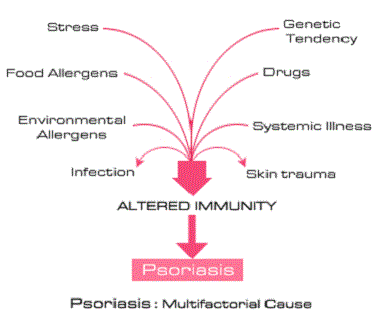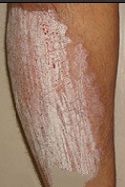- Our Location
- #604 1087 2nd Ave NW CALGARY ALBERTA,
POSTAL CODE T2N 5B2 Canada
- working hours
- Mon - Fri : 9:00 Am - 5:00 Pm
- Our Location
- #604 1087 2ND AVE NW CALGARY ALBERTA,
POSTAL CODE T2N 5B2 CANADA
- working hours
- Mon - Fri : 9:00 Am - 5:00 Pm
Psoriasis: Introduction to Psoriasis
Psoriasis is an obstinate skin condition in which red patches of various sizes develop on the skin that are covered with dry, silvery scales. Psoriasis is a chronic skin disease that got its name from the Greek word meaning, 'itch'.
In psoriasis the skin becomes inflamed and red eruptions appear on the surface of the skin that begin to itch excessively. These areas form thickened areas (plaques) that are covered with silvery scales over the reddened lesions. The skin at the joints may crack.
Location:
Psoriasis most often occurs on the elbows, knees, scalp, lower back, palms, and soles of the feet. However, no area of the skin is exempt, including the genital area. The disease may also affect the fingernails and toenails, and the soft tissues inside the mouth. About 15 percent of people with psoriasis have joint inflammation that produces arthritis symptoms. This condition is called psoriatic arthritis.


Course of diseases:
The course of psoriasis is characterized by remissions and relapse. At some instances the patches disappear, just to appear after some period of time.
There are various factors ranging from climate, stress, infections and injuries that can trigger flare up of disease within short span of time even within few days. On the other hand there are certain other factors such as sunlight that significantly reduces the intensity of problem.
Impact on health:
In some cases, psoriasis is so mild that it may go unnoticed. At the opposite extreme, there are victims having psoriatic patches almost everywhere on the body. People with psoriasis may suffer discomfort, including pain and itching, restricted motion in their joints, and emotional distress.
The unpleasant appearance of the patches, the chronic itching and flaking of psoriasis although is not life threatening, has definite impact on the self-esteem and life style of the psoriasis victim. Substantial time and money are spent trying to keep it under control.
Causes of Psoriasis
The exact cause of psoriasis is not fully understood. The processes involved in the development of psoriasis as largely understood. Although cold climate and some form of injury can aggravate the problem they cannot be labeled as the cause of disease. The precise cause of psoriasis continues to elude the medical fraternity. However, ongoing research in this field has improved our understanding of this disease to some extent. The recent discoveries point to an abnormality in the functioning of key white cells in the blood stream triggering inflammation in the skin. Because of the inflammation, the skin sheds too rapidly, every three to four days.

Internal factors:
1. Defective immune system : Recent research indicates that psoriasis is likely to be a disorder of the immune system. This system includes a type of white blood cell, called a T cell, that normally helps protect the body against infection and disease. Scientists now think that, in psoriasis, an abnormal immune system causes activity by T cells in the skin. These T cells trigger the inflammation and excessive skin cell reproduction seen in people with psoriasis.
2. Genetics and heredity : In about one-third of the cases, psoriasis is inherited. Often, the person with psoriasis has a parent or grandparent who also has the condition. In terms of probability it has been estimated that a person with one affected parent has about a 10% chance of also being affected. Having two parents with psoriasis increases the chances to about 30%.
External factors:
People with psoriasis may notice that there are times when their skin worsens, then improves. Conditions that may cause relapses of flare-ups include:
1. Climate: Studies indicate that cold weather may be a predisposing effect or trigger for psoriasis, in contradistinction to hot and sunny climate that appears to be beneficial.
2. Infections: Both dermatological and systemic infections have been known to trigger the onset of psoriasis or a worsening of psoriasis. Systemic infections that have been associated with triggering include viral upper respiratory disease, streptococcal pharyngitis (strep throat), and human immunodeficiency virus (HIV). Staphylococcal skin infections (boils) have been a trigger.
3. Stress: Psychological stress is the cause as well as out come of disease like psoriasis. It is a well-known fact that there is inseparable bond between mind and body and psyche plays vital role in maintaining health or causing diseases.

4. Certain medicines: Certain medicines, most notably beta-blockers, which are used to treat high blood pressure, and lithium or drugs used to treat depression, may trigger an outbreak or worsen the disease. The drugs may be listed as: lithium, anti-malarials, mepacrine, NSAIDs, beta-blockers, alcohol.
5. Physical trauma: People often notice new spots 10 to 14 days after the skin is cut, scratched, rubbed, or severely sunburned. Analysis of patient records has indicated that up to 50 percent of persons with psoriasis have had a 'Koebner's phenomenon' experience - that is, have had a psoriatic lesion develop at the site of an injury or skin condition.
Symptoms and Types of psoriasis
Although psoriasis may be almost unnoticeable in its early stages, patients often report an itching and/or burning sensation as the disease progresses.
 This photo on the left shows itching (skin after itching) and bleeding spots thereafter, on psoriasis lesions. In this photo, the patient has scratched it profoundly to an extent that there are bleeding spots.
This photo on the left shows itching (skin after itching) and bleeding spots thereafter, on psoriasis lesions. In this photo, the patient has scratched it profoundly to an extent that there are bleeding spots.
There are many variants and types of psoriasis. But usually the course follows like this: It starts with red small bumps on the skin that progress to bigger scaly patches. The condition is associated with lot of itching. As the scales accumulate, pink to deep red plaques with a white crust of silvery scales appear on the skin surface.
ORDER TREATMENT ONLINE
Our Homeopathy treatment is now just a few clicks away.
(Treatment for additional diseases charged at 50%)

 Find
out the chances
Find
out the chances
of cure (Free)

